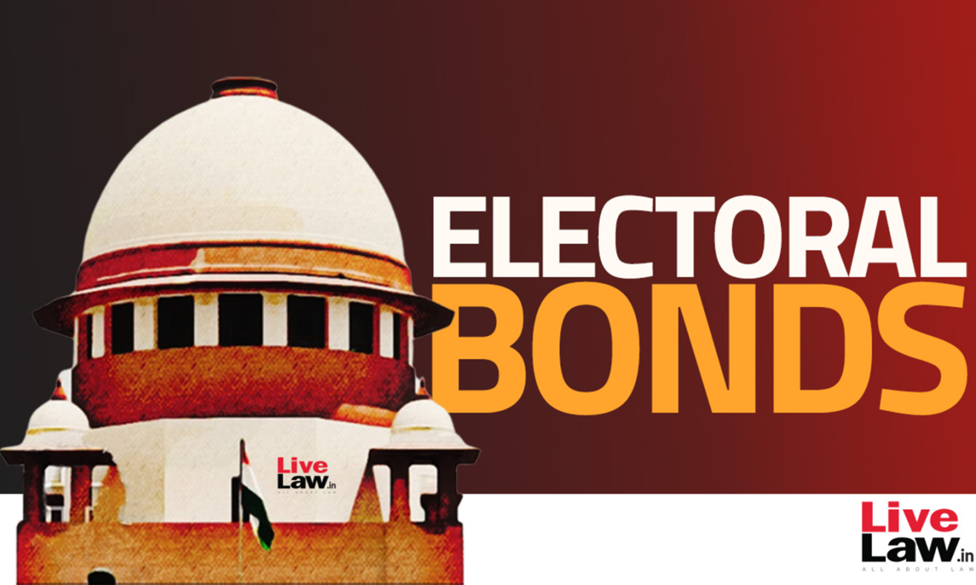STANDING UP FOR THE VOTER
Syllabus:
GS 2:
- Constitution of India —historical underpinnings, evolution, features, amendments, significant provisions and basic structure.
Focus:
- The SC The verdict addresses the controversial Electoral Bond Scheme (EBS) introduced by the Finance Act, 2017.
Source:- live law
The recent unanimous decision by the Constitution Bench of the Supreme Court, authored by Chief Justice D Y Chandrachud, alongside Justices Sanjiv Khanna, B R Gavai, J B Pardiwala, and Manoj Misra, marks a significant milestone in Indian democracy. The verdict addresses the controversial Electoral Bond Scheme (EBS) introduced by the Finance Act, 2017, and its implications for electoral transparency and accountability.
SC Ruling on Electoral Bond Scheme:
- SC declared amendments to the Finance Act, 2017, Representation of the People Act (RPA), 1951, Income Tax Act, 1961, and Companies Act, 2013, as unconstitutional.
- These amendments relaxed requirements for political party funding.
- SC’s judgment reinstated the legal framework before the Finance Act, 2017, in key statutes related to political funding.
- Notably, the Representation of the People Act, 1951, was reverted to its original state.
- Section 29C required political parties to disclose donations exceeding Rs 20,000, balancing transparency with donor privacy.
- This requirement was in place before amendments introduced by the Finance Act, 2017.
- Introduced exception exempting Electoral Bond donations from disclosure.
- Removed cap on corporate donations, altering the transparency landscape in political funding.
- Struck down the amendment exempting Electoral Bonds from disclosure.
- Emphasized the need to balance transparency with donor privacy, reinstating pre-2017 disclosure requirements.
Electoral Bonds: A Brief Overview
|
Doctrine of proportionality
- The Supreme Court (SC) utilized the proportionality test to assess whether a scheme infringed upon voters’ right to information and the transparency of the electoral process.
- The proportionality test acts as a critical legal benchmark for balancing state actions with individual fundamental rights.
- Fundamental rights, including the right to free speech under Article 19(1) of the Constitution, are safeguarded, but can be subject to “reasonable restrictions” outlined in Article 19(2), evaluated through the proportionality test.
- Article 19(2) permits the government to impose reasonable restrictions on freedom of speech and expression, such as those related to national security, public order, decency, or incitement to an offense.
- The proportionality test gained significance following the K.S. Puttaswamy v. Union of India, 2017 ruling, affirming privacy as a fundamental right.
- Reiterated in the Aadhaar Act ruling of 2018, the proportionality test ensures that state actions align with legitimate government interests without disproportionately encroaching upon fundamental rights.
- The government asserted that combating black money and safeguarding donor anonymity serve as legitimate state interests.
- Donor anonymity was portrayed as crucial for preserving donors’ right to privacy, recognized as a fundamental right.
- The government argued that the right to information does not extend to seeking information beyond the state’s possession or knowledge.
Balancing Rights: Privacy vs. Information
- Privacy rights encompass the protection of personal information from unauthorized access, ensuring autonomy and dignity.
- Conversely, access to information is crucial for transparency, accountability, and the functioning of democratic societies.
- The challenge lies in determining when the right to privacy should yield to the public’s right to know, especially concerning matters of public interest or safety.
- Courts often apply a proportionality test to weigh the importance of privacy against the societal benefits of disclosing information.
- Laws and regulations, such as data protection laws and freedom of information acts, aim to establish frameworks for balancing privacy rights with the public’s right to access information.
- Technology adds complexity to this balance, as it enables both enhanced privacy protections and unprecedented access to personal data.
- Striking the right balance requires careful consideration of the context, potential harms, and societal interests at stake.
- Ongoing debates and legal precedents shape the evolving understanding of where the boundaries between privacy and information lie in modern societies.
In conclusion, the Supreme Court’s decision on the Electoral Bond Scheme reaffirms its commitment to upholding democratic principles and protecting the rights of voters. It sets a precedent for transparency and accountability in electoral financing, reflecting the judiciary’s vital role in preserving the integrity of Indian democracy.
Source:
Mains Practice Question:
“Discuss the complexities involved in balancing privacy rights with the public’s right to access information, especially in the context of advancing technology and evolving societal norms. How can legal frameworks and judicial interventions ensure an equitable balance between these fundamental rights? Illustrate your answer with relevant case studies and contemporary examples.”




